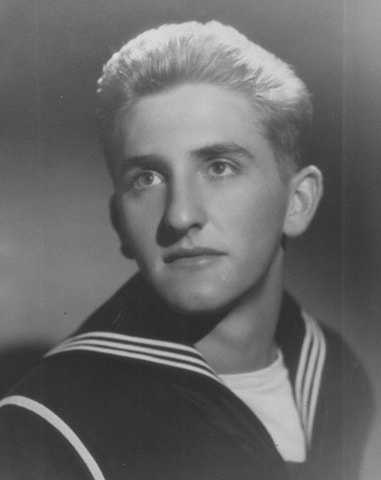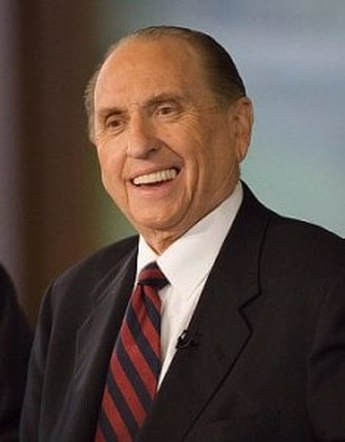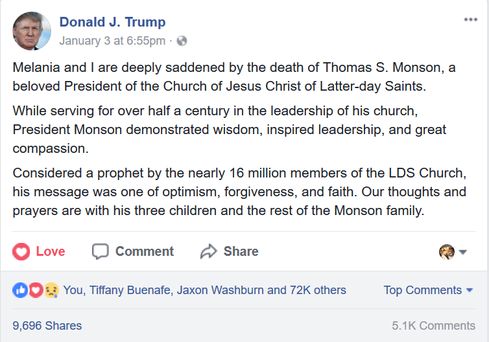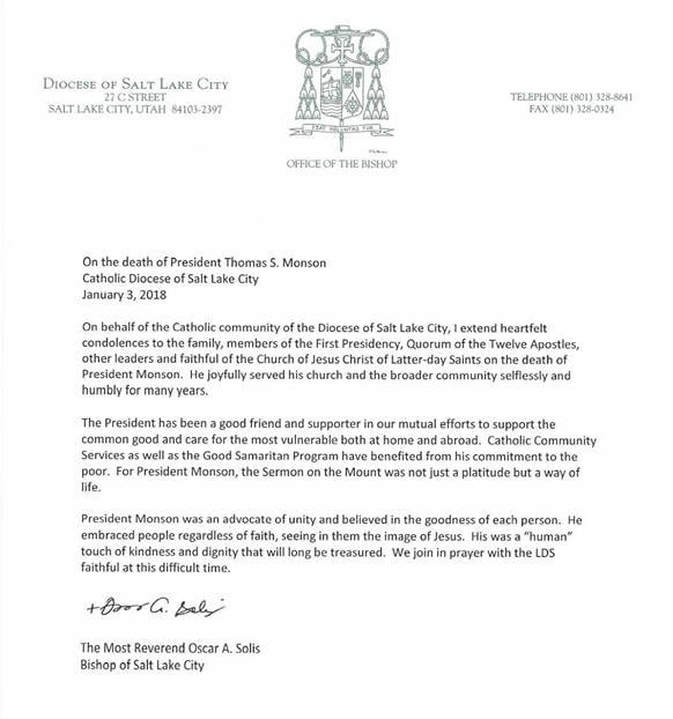|
Writing posts about my life that will appeal to anyone is kind of freaking hard, because I have three main different audiences to keep in mind. *My Utah friends who know me, are mostly conservative, and are mostly LDS or former LDS or are at least very familiar with the LDS Church *My New York friends who know me, are mostly liberal, and are mostly not LDS and don't know the difference between LDS and LSD *Strangers from who knows what religious and political backgrounds who stumble on me through Twitter or Google and don't know me at all Each post is like another page in a narrative that started years ago and will continue until death or injury prevents me from writing more, but it may be the only post that a given person sees. If they happen to catch me criticizing liberals, they'll assume I'm a conservative. If they happen to catch me criticizing conservatives, they'll assume I'm a liberal. Because the way politics work in this country is that you're supposed to choose one of two crappy options and then pretend it's perfect while criticizing the other one. I shouldn't have to put in a disclaimer or counterexample every time I criticize one or the other. And how do I write about Mormon topics that roughly half of my audience is familiar with and roughly the other half is clueless about, without patronizing the one or making no sense to the other? Especially when I enjoy diving into apologetics and scholarship and cultural weirdness that goes way beyond the missionary discussions? I think I've failed spectacularly at that. I don't even know when to say "Mormon" and one to say "LDS". They're interchangeable in my mind but not in everyone else's. So here's yet another bit that Mormons already know and others don't care about. A couple weeks ago Russell M. Nelson became the seventeenth President of The Church of Jesus Christ of Latter-day Saints with Dallin H. Oaks and Henry B. Eyring as counselors. And in the press conference, Peggy Fletcher Stack of the Salt Lake Tribune asked, "So, under President Monson we saw some real advances towards gender equity the loering of the missionary age especially for sisters and also adding women to some of the executive committees but the Church leadership is still white, male, American. What will you do in your Presidency to bring women, people of color, and international members into decison making for the Church?" President Nelson responded in part, "We are white, and we are American. But look at our Quorums of the Seventy and look at our leaders locally. Wherever we go, the leadership of the Church is from the local communities and those are the real leaders. The Twelve and the Seventy are not a representative assembly of any kind. That means we don't have representatives - how would you govern the church with a representative from all of the 188 countries? So somebody's gonna be left out, but it doesn't matter because the Lord's in charge and we'll live to see the day when there will be other flavors in the mix. But we respond because we’ve been called by the Lord. Not one of us asked to be here." The leadership structure of the LDS Church is technically a hierarchy in that people have varying levels of responsibility and authority, but should not be viewed through the same lens as a traditional human hierarchy. Every role is supposed to be seen as equally important. The President of the entire Church is not entitled to any eternal blessing that isn't available to each and every member. Elder Uchtdorf's move from the First Presidency back into the Twelve and President Eyring's move from First to Second Counselor are not "demotions". We are not supposed to aspire to leadership positions, which is fine with me because I don't want any ever. So I fall in the category of those who love and sustain the leadership as presently constituted and also really, really would like to see them more reflect the makeup of modern global membership (even though they aren't a representative body). And, as President Nelson promises here, that will happen soon. (Perhaps very, very soon - did he choose the word "we" carefully despite being 93 years old?) Because diversity has been trickling up through the General Authority ranks for many years and will continue to do so until it runs all the way through. To demonstrate this, I decided to occupy what little time I have outside of school and work to put together an overview of LDS leadership diversity that will probably be of interest to hardly anybody else in or out of the Church. I have chosen to focus on their states/provinces and countries of origin instead of skin color, which I don't think is the most useful lens to view the world through. There may be a few errors or ommissions with regard to where people were born versus where they grew up that I didn't have time to look into, but it should be accurate enough for most intents and purposes. If you find this terribly dull, go read the Book of Mormon instead and come back next week for hopefully something you'll like more. You think I'm joking but I'm not. First Presidency and Quorum of the TwelveRussel M. Nelson - Utah, Dallin H. Oaks - Utah, Henry B. Eyring - New Jersey, M. Russell Ballard - Utah, Jeffrey R. Holland - Utah, Dieter F. Uchtdorf - Germany (born in Czechoslovakia), David A. Bednar - California, Quentin L. Cook - Utah, D. Todd Christofferson - Utah, Neil L. Andersen - Utah, Ronald A. Rasband - Utah, Gary E. Stevenson - Utah, Dale G. Renlund - Utah (but first language is Swedish) Recently deceased: Thomas S. Monson - Utah, Robert D. Hales - New York Over the first few decades these bodies had members from Canada, England, Denmark, and several US states, but after they and the vast majority Mormons emigrated to Utah the diversity of their ranks took a de facto step backward. Diversity takes the longest to reach these upper echelons because the men here have been called after many years of church service and then stay here until they die. I completely understand why some people were angered by the calling of three more white men from Utah in 2015 and would be lying if I said I didn't feel disappointed at first too. But it's only a matter of time. I can't find it now, but I know I once saw a quote from President Spencer W. Kimball that has some relevance, in 1975 I believe, in which he told a gathering of Mormons in Japan that some of them would live to see a Japanese man in the Quorum of the Twelve. I thought it was in "From the East: A History The History of the Latter-day Saints in Asia, 1851-196" by R. Lanier Britsch, but then I couldn't find it in there. If anyone is familiar with this quote please let me know. Presidency of the SeventyL. Whitney Clayton - Utah, Craig C. Christensen - Utah, Ulisses Soares - Brazil, Lynn G. Robbins - Utah, Gerrit W. Gong - California, Juan A. Uceda - Peru, Patrick Kearon - England I once saw an internet commenter complain that ethnically Asian Gerrit W. Gong doesn't count because he's from California and that L. Whitney Clayton sounds like the name of a KKK Grand Dragonmaster. Here's some life advice: if you're that desperate to find similarities between Mormons and the KKK, you're an idiot. General Authority Seventies (First and Second Quorums)Marcos A. Aidukaitis - Brazil, Jose L. Alonso - Mexico, Wilford W. Andersen - Arizona, Ian S. Ardern - New Zealand, Mervyn B. Arnold - Utah, W. Mark Bassett - California, David S. Baxter - Scotland, Randall K. Bennett - Alberta, Shayne M. Bowen - Idaho, Mark A. Bragg - California, Craig A. Cardon - Arizona, Yoon Hwan Choi - South Korea, Kim B. Clark - Utah, Weatherford T. Clayton - California, Carl B. Cook - Utah, Lawrence E. Corbridge - Idaho, Valeri V. Cordón - Guatemala, J. Devn Cornish - Utah, Claudio R. M. Costa - Brazil, Joaquin E. Costa - Argentina, LeGrand R. Curtis Jr. - Utah, Massimo de Feo - Italy, Benjamin de Hoyos - Mexico, Edward Dube - Zimbabwe, Kevin R. Duncan - Utah, Timothy J. Dyches - Utah, Larry J. Echo Hawk - Wyoming, Stanley G. Ellis - Idaho, David F. Evans - Utah, Enrique R. Falabella - Guatemala, Bradley D. Foster - Idaho, Randy D. Funk - Utah, Eduardo Gavarret - Uruguay, Robert C. Gay - California, Carlos A. Godoy - Brazil, Taylor C. Godoy - Peru, Christoffel Golden - South Africa, Walter F. González - Uruguay, C. Scott Grow - Idaho, O. Vincent Haleck - American Samoa, Donald L. Hallstrom - Hawaii, Kevin S. Hamilton - Washington, Allen D. Haynie - California (born in Utah), Paul V. Johnson - Florida, Larry S. Kacher - Minnesota, Jörg Klebingat - Germany, Joni L. Koch - Brazil, Erich W. Kopischke - Germany, Larry R. Lawrence - Maryland, Hugo E. Martinez - Puerto Rico, James B. Martino - Texas, Richard J. Maynes - California, Peter F. Meurs - Australia, Hugo Montoya - Mexico (born in California, Marcus B. Nash - Washington, K. Brett Nattress - Idaho, S. Gifford Nielsen - Utah, Brent H. Nielson - Idaho, Adrián Ochoa - California, Allan F. Packer - Utah, S. Mark Palmer - Texas (born in New Zealand), Adilson de Paula Parrella - Brazil, Kevin W. Pearson - Utah, Anthony D. Perkins - Colorado, Paul B. Pieper - Idaho, John C. Pingree Jr. - Utah, Rafael E. Pino - Venezuela, Michael T. Ringwood - Utah, Gary B. Sabin - California (born in Utah), Evan A. Schmutz - Utah, Gregory A. Schwitzer - Utah, Joseph W. Sitati - Kenya, Steven E. Snow - Utah, Vern P. Stanfill - Montana, Brian K. Taylor - Utah, Michael John U. Teh - Philippines, José A. Teixeira - Portugal, Arnulfo Valenzuela - Mexico, Terence M. Vinson - Australia, Taniela B. Wakolo - Fiji, Scott D. Whiting - Utah, Larry Y. Wilson - Utah, Chi Hong (Sam) Wong - Hong Kong, Kazuhiko Yamashita - Japan (duh), Jorge F. Zeballos - Chile, Claudio D. Zivic - Argentina, W. Craig Zwick - Utah Recently deceased: Von G. Keetch - Utah Here we see that diversity can actually fluctuate within such a small group. There is only one Japanese General Authority, but not long ago there were three. Koichi Aoyagi and Yoshihiko Kikuchi aged out and now have emeritus status. In the First Presidency and the Quorum of the Twelve, which typically only have a combined fifteen slots (there have been more First Presidency counselors at times in the past, but this is unlikely to ever happen again because of changes in the distribution of responsibility since then), diversity in future years will certainly fluctuate even more. General OfficersGérald Caussé - France, Dean M. Davies - Utah, W. Christopher Waddell - California, Jean B. Bingham - Utah, Sharon Eubank - California, Reyna I. Aburto - Nicaragua, Bonnie L. Oscarson - Utah, Carol F. McConkie - Washington, Neill F. Marriot - Louisiana, Joy D. Jones - Oregon, Bonnie H. Cordon - Idaho, Cristina B. Franco - Argentina, Tad R. Callister - California, Devin G. Durrant - Utah, Brian K. Ashton - Utah, Stephen W. Owen - Utah, Douglas D. Holmes - Utah, M. Joseph Brough - Utah Again, diversity fluctuates. Some have assumed that Reyna I. Aburto was the first woman of color in the Relief Society Presidency, but from 1990-97 it had a Japanese-Hawaiian named Chieko Okazaki. The late Sister Okazaki is still remembered and loved for her intimate description of the Atonement and her outreach to those of us who don't fit the cookie cutter of Utah Mormon culture. And I'm almost certain I saw her ghost in the Joseph Smith Memorial Building one time. Anyway... Area SeventiesThese are not included in the chart because they are not global leaders. Unlike the General Authority Seventies in the First and Second Quorums, they keep their normal jobs and keep living in the same spot, presiding only over a local area. However, they are relevant to the discussion because General Authoritie Seventies are often pulled from their ranks. If diversity is trickling up in the LDS Church then we should see it beginning here, along with mission presidents and stake presidents that are obviously too numerous to get into. The quorum numbers are just for convenience and don't refer to actual rank. They are arranged somewhat geographically but then sometimes people are moved between them while staying in the same country/state so I don't know how that works. Third Quorum of the SeventyDetlef H. Adler - Germany, Frederick O. Akinbo - Nigeria, Vladimir N. Astashov - Russia, Matthieu Bennasar - France, Hans T. Boom - The Netherlands, Christopher Charles - England, Walter Chatora - South Africa (born in Zimbabwe), M. T. Ben Davis - Ghana, Z. Dominique Dekaye - Cote d'Ivoire, Alessandro Dini Ciacci - Italy, Aleksandr A. Drachyov - Russia, Robert A. Dryden - England, I. Raymond Egbo - Ghana, Torben Engbjerg - Denmark, Mervyn C. Giddey - South Africa, Marcel Guei - Cote d'Ivoire, Yuriy A. Gushchin - Russia, Daniel P. Hall - South Africa, Clifford T. Herbertson - England, Tom-Atle Herland - Norway, Karl D. Hirst - England, David P. Homer - Utah (currently in Ontario), J. K. Chukwuemeka Igwe - Nigeria, Aniefiok Udo Inyon - Nigeria, Anthony M. Kaku - Ghana, Christophe Kawaya - Democratic Republic of Congo, John A. Koranteng - Ghana, Axel H. Leimer - Germany, W. Jean-Pierre Lono - Democratic Republic of Congo, L. Jean Claude Mabaya - Democratic Republic of Congo, Declan O. Madu - Nigeria, Tasara Makasi - South Africa, Khumbulani Mdletshe - South Africa, Artur J. Miranda - South Africa, Elie K. Monga - Republic of the Congo, Joaquim J. Moreira - Portugal, Adonay S. Obando - Mexico, Adeyinka A. Ojediran - Nigeria, Alan T. Phillips - England, Wolfgang Pilz - Germany, Gennady N. Podvodov - Ukraine, Gary S. Price - Utah? (currently in Saudi Arabia), Anthony Quaisie - Ghana, Francisco J. Ruiz de Mendoza - Spain, Alexey V. Samaykin - Russia, K. Roy Tunnicliffe - England, Jacques A. Van Reenen - South Africa, Daniel Yirenya-Tawiah - Ghana I find it interesting that only one of these men is from Norway and therefore of value while several of the others, according to the President of the United States, are from "----hole countries" and therefore worthless. But that's none of my business. Fourth Quorum of the SeventyJulio C. Acosta - Dominican Republic, Quilmer A. Agüero - Peru, Angel H. Alarcon - Peru, Omar A. Alvarez - Venezuela, Luis R. Arbizú - El Salvador, Nelson Ardila - Colombia, Carlos F. Arredondo - Guatemala, Winsor Balderrama - Bolivia, David A. Benalcázar - Ecuador, Hubermann Bien-Aimé - Haiti, Fernando E. Calderón - Ecuador, Wilson B. Calderón - Peru, Hernando Camargo - Colombia, Luis J. Camey - Guatemala, Armando Carreón - Mexico, Nicolás Castañeda - Mexico, Luis C. Chaverri - Costa Rica, Pablo H. Chavez - Honduras, Ulises Chávez - Mexico, Marion B. De Antuñano - Mexico, Fernando P. Del Carpio - Peru, Ángel A. Duarte - El Salvador, E. Xavier Espinoza - Ecuador, José A. Fernández - Mexico, Candido Fortuna - Dominican Republic, Sam M. Galvez - Guatemala, Claude R. Gamiette - Guadelupe, Jorge A. García - Mexico, Guillermo I. Guardia - Venezuela, Mathias Held - Colombia, José Hernández - Honduras, Bhanu K. Hiranandani - Venezuela, Jose L. Isaguirre - Mexico, Pedro X. Larreal - Mexico, Carlo M. Lezano - Peru, Alejandro Lopez - Guatemala, José E. Maravilla - Guatemala, Felix A. Martinez - Mexico, Joel Martinez - Mexico, Alexander T. Mestre - Venezuela, Alfredo Miron - Mexico, Helamán Montejo - Mexico, A. Fabio Moscoso - Peru, Jared R. Ocampo - Honduras, Jesús A. Ortiz - Mexico, A. Moroni Pérez - Guatemala, José C. Pineda - Mexico, Juan C. Pozo - Bolivia, Abraham E. Quero - Venezuela, Miguel A. Reyes - Mexico, Sandino Roman - Mexico, Rene Romay - Mexico, Johnny F. Ruiz - Panama, Luis G. Ruiz - Mexico, Jorge L. Saldívar - Mexico, C. Walter Treviño - Mexico, Ricardo Valladares - Honduras, Jesús Velez - Mexico, Moisés Villanueva - Mexico, Cesar E. Villar - Peru Fifth Quorum of the Seventy Ruben Acosta - California, Blake R. Alder - Idaho, Aley K. Auna Jr. - Hawaii, Steven R. Bangerter - Utah, Alan C. Batt - Idaho, Jorge T. Becerra - Utah, Lawrence P. Blunck - Oregon, Michael H. Bourne - Utah, Bradford C. Bowen - Idaho, Berne S. Broadbent - Utah, L. Todd Budge - Utah, Robert M. Call - Washington, Gene R. Chidester - Utah, Brent J. Christensen - Utah, Raymond A. Cutler - Utah, Douglas L. Dance - Utah, Marc C. Davis - California, Ralph L. Dewsnup - Utah, J. Scott Dorius - California, M. Dirk Driscoll - Idaho, Mark P. Durham - Utah, J. Kevin Ence - Utah, Jeffrey D. Erekson - Idaho, Gary F. Gessel - Washington, Bruce E. Ghent - California, Richard K. Hansen - Oregon, Todd B. Hansen - Arizona, Michael R. Jensen - Utah, Steven O. Laing - Utah, Bryan R. Larsen - Utah, John A. McCune - Utah, Kyle S. McKay - Utah, Kevin K. Miskin - California, Dale H. Munk - Utah, Michael R. Murray - Washington, Norman R. Nemrow - Utah, Mark L. Pace - Utah, Steven Merrill Petersen - Utah, Jay D. Pimentel - California, Steven K. Randall - Utah, James R. Rasband - Utah, Blake M. Roney - Utah, R. Scott Runia - Utah, Netzahualcoyotl Salinas - Mexico, Eric J. Schmutz - Utah, Edwin A. Sexton - Idaho, Alin Spannaus - Argentina, David L. Stapleton - Washington, David T. Warner - Utah, Paul H. Watkins - California, Gary K. Wilde - California, William B. Woahn - Utah, Kevin J. Worthen Sixth Quorum of the SeventyRené R. Alba - Georgia, Alain L. Allard - Quebec, Michael V. Beheshti - Arkansas, Grant C. Bennett - Massachusetts, R. Randall Bluth - Louisiana, David L. Buckner - New York, Kevin E. Calderwood - Virginia, Matthew L. Carpenter - Colorado, Douglas B. Carter - Florida, S. Marc Clay Jr. - New York, Michael M. Dudley - Virginia, Daniel F. Dunnigan - Michigan, James E. Evanson - Alberta, K. Mark Frost - Arizona, Michael A. Gillenwater - Indiana, Leonard D. Greer - Arizona, Raymond S. Heyman - Arizona, Paul F. Hintze - Missouri, Ren S. Johnson - Nevada, Daniel W. Jones - Texas, Jay B. Jones - Texas, Milan F. Kunz - Pennsylvania, Todd S. Larkin - Nevada, J Vaun McArthur - South Carolina, Fred A. Parker - Georgia, Thomas T. Priday - Colorado, Brian L. Rawson - Kansas, Robert C. Rhien - New Mexico, Ciro Schmeil - Brazil, K. David Scott - Illinois, Paul H. Sinclair - Indiana, Gordon H. Smith - Oregon (currently in Maryland), Michael L. Southward - Oklahoma, G. Lawrence Spackman - Alberta, Rulon F. Stacey - Minnesota, William H. Stoddard - Nevada, Stephen E. Thompson - Florida, Karl M. Tilleman - Arizona, William R. Titera - Ohio, Maxsimo C. Torres - New Mexico, Carlos Villarreal - Texas, C. Dale Willis Jr. - Arizona Fred A. Parker is black. I know I'm not supposed to be focusing on skin color but I thought some people would like to know that. Seventh Quorum of the SeventyP. David Agazzani - Argentina, B. Sergio Antunes - Brazil, José M. Batalla - Argentina, Rómulo V. Cabrera - Uruguay, José C. F. Campos - Brazil, Sergio Luis Carboni - Brazil, H. Marcelo Cardus - Argentina, Luciano Cascardi - Brazil, Aroldo B. Cavalcante - Brazil, José L. Del Guerso - Brazil, Osvaldo Rietra Dias - Brazil, Antonio F. Faúndez - Chile, Matías D. Fernández - Argentina, Paschoal F. Fortunato - Brazil, Carlos R. Fusco Jr. - Brazil, Patricio M. Giuffra - Chile, Maurício G. Gonzaga - Brazil, João Roberto Grahl - Brazil, Francisco D. N. Granja - Brazil, Sergio L. Krasnoselsky - Argentina, Luiz M. Leal - Brazil, Juan J. Levrino - Argentina, Geraldo Lima - Brazil, Eduardo A. Norambuena - Chile, Carlos E. Perrotti - Brazil, Raimundo Pacheco De Pinho - Brazil, Edvaldo B. Pinto Jr. - Brazil, Marco A. Rais - Brazil, Martin C. Rios - Argentina, Jorge Luis Romeu - Argentina, Alfredo L. Salas - Argentina, Pedro A. Sanhueza - Chile, Raúl H. Spitale - Argentina, Heber D. Texeira - Paraguay, Carlos R. Toledo - Brazil, Moroni B. Torgan - Brazil, Juan A. Urra - Chile, Juan Pablo Villar - Chile, Luis G. Zapata - Chile Eighth Quorum of the SeventyPedro U. Adduru - Philippines, Taiichi Aoba - Japan, Victorina A. Babida - Philippines, Richard Baquiran - Philippines, Dong Chol Beh - South Korea, Ting Tsung Chang - Taiwan, Zeno Chow - Hong Kong, Paul R. Coward - New Zealand, Robert J. Dudfield - Australia, Meliula M. Fata - Samoa, Daniel G. Hamilton - Australia, Toru Hayashi - Japan, Adolf J. Johansson - New Zealand, Tae Gul Jung - South Korea, Wisit Khanakham - Thailand, Seung Hoon Koo - South Korea, Ming-Shun Kuan - Taiwan, Paul N. Lekias - Australia, Johnny L. Leota - Australia, Tomas S. Merdegia Jr. - Philippines, Alvin F. Meredith III - Tennessee, Yutaka Onda - Japan, Andrew M. O'Riordan - Australia, Katsuyuki Oahara - Japan, Ryan V. Pagaduan - Philippines, Abenir V. Pajaro - Philippines, Ferdinand P. Pangan - Philippines, Jairus C. Perez - Philippines, Mark P. Peteru - Australia, Siu Hong Pon - Hong Kong, Carlos G. Revillo Jr. - Philippines, Maximo A. Saavedra Jr. - Philippines, Benjamin T. Sinjoux - French Polynesia, Benjamin Ming Zhe Tai - Hong Kong, David J. Thomson - New Zealand, George J. Tobias - Philippines, Seiji Tokuzawa - Japan, Steven L. Toronto - Utah (currently in China), 'Aisake K. Tukuafu - Tonga, Raul Edgardo A. Vicencio - Philippines, Raul S. Villanueva - Philippines, Keith P. Walker - Australia, Robert K. William - India, Hoi Seng Leonard Woo - Singapore I first assumed from the name "Robert K. William" that he was a white man from Utah living in India, but nope, he's native and brown and I'm a little bit racist. ConclusionSince this took a long time to put together I don't feel like writing much more. So I will close by completely changing the subject with some of President Eyring's words from the broadcast preceding the press conference. "The growth in the number of members and their spread across nations, kindreds, tongues, and peoples are visible miracles, but the greater miracle - and the one which will accelerate - is the growth in faith in Jesus Christ. This is a great time in the history of the Church. And yes, the best is still to come."
How exciting!
0 Comments
If you don't accept that humans are a product of evolution and still subject to natural selection, then I don't know how you make sense of the fact that teenagers are daring each other to eat laundry detergent. If I'd ever had a shred of faith in humanity, I might be surprised that I'm putting those words in a sentance in that order, but I hadn't and I'm not. Some people see this as a problem. I don't. But in an effort to be more compassionate, I've tried to think of how I would feel if my own teenager died from eating laundry detergent. Me: *sobs uncontrollably* Bystander: I know, it's always hard to lose a loved one... Me: No, I'm crying because my genetic material created something that stupid. Actually, this is implausible because, like I said. my teenager would most likely be adopted. Anyway, on to the main portion of our program. How good it feels to be returning to school nearly three years after I was supposed to graduate. How good it feels to still see some familiar faces from a year and a half ago or more. The man whom I may have to kill if he turns out to be a better writer than me. The woman who always looks like she's wincing from a terrible pun. The man whom I never spoke with in the previous class we were in together but who now wants to be best friends. The woman who - wait, is that her, or is it a sister or something? She looks slightly different... I can't tell... The man with long, silky, flawless, sexuality-confusing hair. And so on and so forth. Here is an edge-of-your-seat-thrilling rundown of the classes I'm taking this semester. I'm already far busier than any semester before and it looks like homework is going to be my primary hobby six days a week for the next four months. I attracted a few stares in the bookstore as I shuffled to the register with my literally twenty books. Bookstore Worker: Do you need help finding anything? Me (out loud): No thank you. Me (not out loud): I know how the alphabet works, thanks. And also, every class requires participation as part of the grade. So I've been proactive in each class at contributing something as soon as I can so I can relax, and most of my comments end up being kind of banal and useless and everyone probably thinks I'm a simpleton. Me: It reminds me of "Shrek" because he said ogres are like onions and they have layers... Professor: Ha, so you're saying [intellectual articulate stuff]. Me: Yeah. ShakespeareThat's it, the class is just called "Shakespeare". It's a 4000 level class and about five minutes into it I was thinking, Uh, you do realize I have other classes, right? I had four days to read "The Taming of the Shrew", but I misunderstood and read it in two days, which was fine because I had no shortage of other homework. I'm not sure what to think of it. It's so misogynistic it makes Donald Drumpf look like Gloria Steinem, but it's also a thousand times more intelligently written than his Tweets. Obviously our female professor feels that it has some redeeming value somehow. We discussed at length the various mental gymnastics that can be employed to make Petruchio seem like less of a monster. I don't understand his methodology anyway. Being deprived of sleep doesn't make me more compliant, it makes me more homicidal. That's hyperbole. Mostly. I can't wait to read other, less repugnant Shakespeare plays because I actually quite enjoy him and wish people were still that smart. Unveiling the AnthropoceneJust another English student in the music building for a science class, that's me. I started out in the sciences. I majored in Wildlife Science for a few years and that's how I took a bunch of biology classes, came out of the closet as an evolutionist and gained the expertise to refute every creationist I've ever argued with on the internet. Even though I ultimately decided that I don't love science and would rather just stare at its butt as it walks by, I have no regrets about spending that time in that area. And I certainly never imagined that I would come back to it so near the end. This class meets some requirement or other. It's not entirely a science class, but wants to equip us to make science accessible to normal people through art, so obviously that's where the connection comes in. I definitely want to use art to convince people to agree with me on science, religion, politics, and which Star Wars movie is the best (but actually we all know what that is already). We watched an hour and a half National Geographic documentary called "The Story of Earth". I was riveted. I knew many of these facts, of course, and had read a ton about dinosaurs, but to see the whole thing animated from start to finish was a new and enrapturing experience. The British narrator's pronunciations were occasionally a bit jarring, though. In his mouth algea was "AL-gee" and methane was "MEE-thane". I have to wonder, in a class like this, how many students are Mormons and how many of those Mormons are resisting what they're hearing because they don't believe in evolution. And I wonder how many are conservatives and how many of those conservatives are resisting what they're hearing because they don't believe in climate change. I didn't believe in either of those things when I took my first college biology class but I put aside my biases and listened to the material anyway and here I am now. Survey of American CultureAmerican culture is obviously difficult to define because, contrary to what the current admistration obviously believes, it's a melting pot that incorporates every other culture in the world. Yet at the same time, it's distinctive enough to be recognized as it in turn forces itself onto every other culture in the world. I've given some thought in the past to how I would define uniquely American culture: spirit of free enterprise, gun fetish, fast food, pornography, rap music, country music, cowboys, getting offended, lawsuits, Hollywood, leg-humping obsession with skin color, polarized mud-slinging politics, creationism, separation of church and state. Looks like I get to find out how close to the mark I was. I'm the least concerned about this class because it's only a 2000 level and the professor's name is Christopher so he's already biased in my favor. One day he showed us three songs and asked us to brainstorm what they say about American culture. John Mellencamp - Our CountryWe seemed to reach a consensus that John Mellencamp had a bit of a White Savior complex and played into stereotypes a little too much, but his heart was in the right place, and this was back in the unenlightened days of 2007 before we'd ever had a black president and so on. Tracy Chapman - Fast CarI actually love this song for both the melody and the nostalgia of hanging out with Cece, but I never paid much attention to the lyrics. Even now if you put a gun to my head all I could recite with total confidence is "You've got a fast car". So it turns out the lyrics tell a depressing story about being unable to achieve the American dream. Kendrick Lamar - FEEL. |
"Guys. Chris's blog is the stuff of legends. If you’re ever looking for a good read, check this out!"
- Amelia Whitlock "I don't know how well you know Christopher Randall Nicholson, but... he's trolling. You should read his blog. It's delightful." - David Young About the AuthorC. Randall Nicholson is a white cisgender Christian male, so you can hate him without guilt, but he's also autistic and asexual, so you can't, unless you're an anti-vaxxer, in which case the feeling is mutual. This blog is where he periodically rants about life, the universe, and/or everything. Archives
July 2024
Categories
All
|
- Home
- Blog
-
My Literary Works
- Comics by C. Randall Nicholson >
-
Short Stories by C. Randall Nicholson
>
- Childish Stories
- My Dearest Catherine
- It's Really Cold Out There
- Walter Mitty - The Sixth Daydream
- Jesus is a Liberal
- El Coronel - Epílogo
- A Couple of Very Cynical Parables
- Interview with the Ruler of the World (Me)
- The Star Wars Missionary
- Chelise
- Traumfrau
- All Hands on Deck
- It Ain't Ogre Till It's Ogre
- Black Tom: The Unauthorized Encore
- Brittany and the Bear
- Lunatics: A Space Girls Story
- Adventures in the FDR >
- Poems and Songs by C. Randall Nicholson >
-
Essays by C. Randall Nicholson
>
- Childish Essays by C. Randall Nicholson
- Los Braceros
- The Great Pacific Garbage Patch
- The Witches of "Macbeth"
- Evita
- The Second Amendment to the Constitution: Why it is Important to Our Nation
- USU Honors Program Application Essay
- The Giraffe Deception
- Member Missionary Message
- I'm Just a Little Unwell: Coping with Asperger's Syndrome
- Dating Seminar
- An Open Letter to Critics of The Church of Jesus Christ of Latter-day Saints
- How Can any Intelligent Person Be a Mormon?
- Faith and Doubt in My Life
- Discarding Dated Dinosaur Dogmas: Robert T. Bakker and the Dinosaur Renaissance
- Religion, Science, and Art: Elements of the Gospel of Truth
- Why Latter-day Saints Should Embrace Evolution
- Daoism
- Spiritual Autobiography
- From the East: Hinduism and Islam as Compared to My Western Faith Tradition through Poetry
- In Defense of Pickup Lines
- Ass Burgers
- Chasing Kelsey
- Both of the Things Wrong with Charlotte Temple
- Sir Thomas More's Critiques and Commendations for Catholicism
- The Legend of Christor
- How Eugene England Helped Me Transform My Testimony
- Graduate School Statement of Intent
- "Please Join with Us Now in Common Purpose": A Discourse Analysis
- Legos and Gender
- Things That Rhyme with "Elise"
- I Want to Believe: The Persistence of Alien Folklore
-
Reviews by C. Randall Nicholson
>
- Review of "Howard the Duck"
- Review of "Letter to a Christian Nation"
- Review of the LDS Institute's "Uncommon Hour"
- Review of "Madagascar 3"
- Review of "Dating Doctor David Coleman"
- Review of "David and the Magic Pearl"
- Review of the "Mata Nui Online Game (MNOG)"
- Review of "Evolution and Mormonism"
- Review of "Callahan's Crosstime Saloon" (Game)
- Review of "Modern Romance"
- Review of "Solo: A Star Wars Story"
- Review of "The Legend of Zelda: Ocarina of Time"
- Review of "The Book of Mormon" (Musical)
- Review of Jenson Books
- Review of "Live Not By Lies"
-
Literary Fragments by C. Randall Nicholson
>
- Childish Scraps
- The Adventures of Nichch Bror
- Reaching (for the Stars)
- Boys vs. Girls Book 1: The Conflict >
- Dave is a Square
- Star Wreck
-
The Legend of Aaron LaBarr
>
- 1 Marauders of the Mythical Man Chapter One
- 1 Marauders of the Mythical Man Chapter Two
- 1 Marauders of the Mythical Man Chapter Three (Unfinished)
- 1 Marauders of the Mythical Man Chapter Four (Unfinished)
- 2 Crusaders of the Crystalline Chronostone Chapter One (Unfinished)
- 2 Crusaders of the Crystalline Chronostone Chapter Two (Unfinished)
- 2 Crusaders of the Crystalline Chronostone Chapter Three (Unfinished)
- 2 Crusaders of the Crystalline Chronostone Miscellaneous
- 3 Pursuers of the Priceless Power Chapter Two (Unfinished)
- The War >
- The Space Detective
- Skin Deep
- The Sword of Laban >
- LDS Church History Timeline
- Jennifer and Lance
- Logan YSA 36th Ward 2018 History
- Unsent Correspondence by C. Randall Nicholson
- Correspondence Regarding the Worst Day of My Life So Far
-
Indiana Jones and the Saucer Men from Mars
>
- Indiana Jones and the Saucer Men from Mars - Prologue
- Indiana Jones and the Saucer Men from Mars - Chapter One
- Indiana Jones and the Saucer Men from Mars - Chapter Two
- Indiana Jones and the Saucer Men from Mars - Chapter Three
- Indiana Jones and the Saucer Men from Mars - Chapter Four
- Indiana Jones and the Saucer Men from Mars - Chapter Five
- Indiana Jones and the Saucer Men from Mars - Chapter Six
- Indiana Jones and the Saucer Men from Mars - Chapter Seven
- Indiana Jones and the Saucer Men from Mars - Chapter Eight
- Indiana Jones and the Saucer Men from Mars - Chapter Nine
- Indiana Jones and the Saucer Men from Mars - Chapter Ten
- Indiana Jones and the Saucer Men from Mars - Chapter Eleven
- Indiana Jones and the Saucer Men from Mars - Chapter Twelve
- Indiana Jones and the Saucer Men from Mars - Chapter Thirteen
- Indiana Jones and the Saucer Men from Mars - Epilogue
- Behind the Scenes of "Indiana Jones and the Saucer Men from Mars"
-
Indiana Jones and the Monkey King
>
- Indiana Jones and the Monkey King - Prologue
- Indiana Jones and the Monkey King - Chapter One
- Indiana Jones and the Monkey King - Chapter Two
- Indiana Jones and the Monkey King - Chapter Three
- Indiana Jones and the Monkey King - Chapter Four
- Indiana Jones and the Monkey King - Chapter Five
- Indiana Jones and the Monkey King - Chapter Six
- Indiana Jones and the Monkey King - Chapter Seven
- Indiana Jones and the Monkey King - Chapter Eight
- Indiana Jones and the Monkey King - Chapter Nine
- Indiana Jones and the Monkey King - Chapter Ten
- Indiana Jones and the Monkey King - Chapter Eleven
- Indiana Jones and the Monkey King - Chapter Twelve
- Indiana Jones and the Monkey King - Chapter Thirteen
- Indiana Jones and the Monkey King - Chapter Fourteen
- Indiana Jones and the Monkey King - Epilogue
- Running Logan Canyon
- Crusaders of the Chrono-Crystal >
-
About Me
-
About Mormons
- Why Are Mormons So Hot?
- LDS Temples
-
LDS Scriptures
>
- Growth of the LDS Church
-
LDS Racial History
>
- The Lamanite Curse in the Book of Mormon
- The LDS Church and Native Americans Nineteenth Century
- The LDS Church and Native Americans Twentieth Century
- The LDS Church and Native Americans Twenty-first Century
- Black Latter-day Saints Before June 1978
- Abner Howell, Black Latter-day Saint
- Dr. Lowry Nelson vs. the LDS First Presidency
- Race Problems - As They Affect the Church
- Ezra Taft Benson vs. the Civil Rights Movement
- The LDS Church and Slavery
- The LDS Church and Interracial Marriage
- The LDS Church and Black People: Historical Context (Pre-1830)
- The LDS Church and Black People 1830-1837
- The LDS Church and Black People 1838-1842
- The LDS Church and Black People 1843-1844
- The LDS Church and Black People 1845-1848
- The LDS Church and Black People 1849-1852
- The LDS Church and Black People 1853-1860
- The LDS Church and Black People 1861-1868
- The LDS Church and Black People 1869-1878
- The LDS Church and Black People 1879-1889
- The LDS Church and Black People 1890-1899
- The LDS Church and Black People 1900-1903
- The LDS Church and Black People 1904-1907
- The LDS Church and Black People 1908-1912
- The LDS Church and Black People 1913-1930
- The LDS Church and Black People 1931-1946
- The LDS Church and Black People 1947
- The LDS Church and Black People 1948-1954
- The LDS Church and Black People 1955-1959
- The LDS Church and Black People 1960
- The LDS Church and Black People 1961-1962
- The LDS Church and Black People 1963
- The LDS Church and Black People 1964
- The LDS Church and Black People 1965
- The LDS Church and Black People 1966
- The LDS Church and Black People 1967
- The LDS Church and Black People 1968
- The LDS Church and Black People 1969
- The LDS Church and Black People 1970
- The LDS Church and Black People 1971-1972
- The LDS Church and Black People 1973-1975
- The LDS Church and Black People 1976-1977
- The LDS Church and Black People 1978
- The LDS Church and Black People 1979-1984
- The LDS Church and Black People 1985-1988
- The LDS Church and Black People 1989-1994
- The LDS Church and Black People 1995-1998
- The LDS Church and Black People 1999-2002
- The LDS Church and Black People 2003-2006
- The LDS Church and Black People 2007-2010
- The LDS Church and Black People 2011-2012
- The LDS Church and Black People 2013-2015
- The LDS Church and Black People 2016-2017
- The LDS Church and Black People 2018
- The LDS Church and Black People 2019
- The LDS Church and Black People 2020
- The LDS Church and Black People 2021
- The LDS Church and Black People: Moving Forward
- The Bruce R. McConkie Fan Page
- LDS Culture Pet Peeves
- Why I Wholeheartedly Accept Organic Evolution >
- Are the General Authorities Human?
- A Brief History of LDS Polygamy
- A Brief History of Women in the LDS Church >
- Is the LDS Church Homophobic? >
- The LDS Church and Islam / كنيسة يسوع المسيح والإسلام
- Heavenly Mother
- Mormons in America
- The Tragedy of Kip Eliason
- Is the Book of Mormon a Fraud
- Joseph Smith's Prophecies >
- Mormonism's Infallible Prophets
- A Response to the Address "The Real Meaning of the Atonement"
- Affection in Marriage
- Is There No Help for the Widow's Son?
-
An Address to All Believers in Christ
>
- An Address to All Believers in Christ - Chapter I
- An Address to All Believers in Christ - Chapter II
- An Address to All Believers in Christ - Chapter III
- An Address to All Believers in Christ - Chapter IV
- An Address to All Believers in Christ - Chapter V
- An Address to All Believers in Christ - Chapter VI
- An Address to All Believers in Christ - Chapter VII
- An Address to All Believers in Christ - Chapter VIII
- An Address to All Believers in Christ - Chapter IX
- An Address to All Believers in Christ - Chapter X
- An Address to All Believers in Christ - Chapter XI
- An Address to All Believers in Christ - Chapter XII
-
These Amazing Mormons!
>
- Introduction
- I. Meeting the Mormons
- II. Holy Books
- III. The Capital of Mormondom
- IV. Industrial Adaptation
- V. Church Organization
- VI. The Priesthood
- VII. Relief Society
- VIII. Church Welfare Program
- IX. The Word of Wisdom
- X. Business, Labor, Politics
- XI. Architecture
- XII. Education
- XIII. Their Missionary System
- XIV. Propaganda
- XV. The Family
- XVI. Sunday School
- XVII. Primary
- XVIII. Young People
- XIX. The Temple
- XX. Polygamy
- About the Author
- Anti-Mormonism >
- Why I Left the Church of Jesus Christ of Latter-day Saints
-
Whatever
- The Milo Nicholson Memorial Page
- My Unsolicited Spiel on Abortion
- Anti-Vaxxers Make Me Sick
- In Defense of Pedophiles
- The Kyle Cootware Memorial Page
- My Artistic Creations
- Women >
- How to Make a Movie
- The Progressive Bill of "Rights"
- Back in the USSR
- Why We Should Support the War on Drugs
- Why I Love India
- The Joys of DOSBox
- The Hugh Hefner Memorial Page
- Why Engagement Rings are Stupid
- Creating a Pedagogy of Critical Thinking and Student Agency
- Karzahni
- Contact
- Links
crandallnicholson at gmail dot com
My other websites:
Amazon Author Page
Life, the Universe, and Everything Wiki
Entebbe Alpha & Omega Development Organization Uganda
Everything that can be copyrighted by me is © C. Randall Nicholson (he/him) 2010-2024, and everything that cannot is not. As should be obvious to any reasonable person, this website is not owned by, endorsed by, sponsored by, accepting bribes from, or affiliated in any way with The Church of Jesus Christ of Latter-day Saints, Utah State University, any political parties or candidates, Lucasfilm, Nintendo, the Irish Mafia, or anyone else except me. The inclusion of external sources is not an endorsement of every viewpoint or claim contained therein. Due to government restrictions, this website is not available in Abbudin, Agrabah, Aidnaryk, Aldastan, Aldovia, Aleshar, Algaria, Alphenlicht, Andalasia, Ankh-Morpork, Arcium, Arendelle, Arendia, Arjuna, Armaeth, Artakha, Artidax, Astel, Atan, Attolia, Avalon, Beltrazo, Benlucca, Berzerkistan, Bialya, Blefuscu, Borduria, Borogravia, Brovania, Brynnel, Bulungi, Calatia, Caldonia, Cammoria, Carbombya, Carnolitz, Casbahmopolis, Catan, Cherek, Chima, Chyrellos, Cthol Murgos, Cynesga, Cythera, Daconia, Dacovia, Däfos, Dalasia, Dalsona, Daxia, Deira, Delchin, Deltora, Derka-derkastan, Destral, Dinotopia, Drasnia, Duban, Dubatio, Eddis, Edom, Eire, Elbonia, Elenia, Enchancia, Equatorial Kundu, Equestria, Erewhon, Flatland, Florin, France, Freedonia, Fuh, Gamelon, Ganesia, Gar og Nadrak, Genosha, Genovia, Gilead, Goona, Gorch, Grand Fenwick, Guilder, Gwyliath, Haganistan, Holodrum, Honalee, Hortensia, Hyrule, Hytopia, Illyria, Ishtar, Jedera, Jemal, Jenno, Jiardasia, Jueland, Kadir, Kalynthia, Kamistan, Kantaria, Katakor, Katurrah, Kazhistan, Khairpura-Bhandanna, Khakistan, Khemed, Kibalakaboo, Koholint, Kookatumdee, Koridai, Krakozhia, Kumranistan, Kunami, Kyrat, Kyrzbekistan, Labrynna, Lamorkand, Latveria, Lemmink, Lichtenslava, Lilliput, Lorule, Lotharia, Lubovosk, Maldonia, Maragor, Mata Nui, Matar, Medici, Mesociam, Metru Nui, Mishrak ac Thull, Moldera, Monterria, Muldavia, Nambutu, Narnia, Naruba, Nehwon, North Azbaristan, Nuevo-Rico, Nutopia, Nyissa, Nynrah, Odina, Okoto, Oriana, Oz, Pallia, Panem, Pappyland, Patusan, Pelosia, Penglia, Perivor, Pilchardania, Pincoya, Pingo-Pongo, Poldavia, Poptropica, Pottsylvania, Quelf, Qumar, Qumran, Qurac, Ramat, Rendor, Riva, Ronguay, Ruritania, Samavia, San Lorenzo, San Theodoros, São Madrigal, São Rico, Scatland, Schmuldavia, Sendaria, Shamar, Slafka, Slokovia, Slorenia, Sodor, Sokovia, Sondonesia, Sosaria, Sounis, South Azbaristan, Stelt, Strong Badia, Subrosia, Syldavia, Sylvania, Tamul, Tanol, Tarenta, Tashistan, Tega, Terabithia, Termina, Tetaragua, Thalesia, Thatotherstan, Thulahn, Tolemac, Tolnedra, Tomania, Transia, Trazere, Turaqistan, Turmezistan, Ul'dah, Ulgoland, the United States of Auradon, Utopia, Valesia, Velattiane, Voresbo, Voya Nui, Wadata, Wadiya, Wakanda, Westeros, Wongo, Wrenly, Xanth, Xia, Zakaz, Zamad, Zamunda, Zaraq, Zekistan, or Zenovia. I apologize for the inconvenience.
My other websites:
Amazon Author Page
Life, the Universe, and Everything Wiki
Entebbe Alpha & Omega Development Organization Uganda
Everything that can be copyrighted by me is © C. Randall Nicholson (he/him) 2010-2024, and everything that cannot is not. As should be obvious to any reasonable person, this website is not owned by, endorsed by, sponsored by, accepting bribes from, or affiliated in any way with The Church of Jesus Christ of Latter-day Saints, Utah State University, any political parties or candidates, Lucasfilm, Nintendo, the Irish Mafia, or anyone else except me. The inclusion of external sources is not an endorsement of every viewpoint or claim contained therein. Due to government restrictions, this website is not available in Abbudin, Agrabah, Aidnaryk, Aldastan, Aldovia, Aleshar, Algaria, Alphenlicht, Andalasia, Ankh-Morpork, Arcium, Arendelle, Arendia, Arjuna, Armaeth, Artakha, Artidax, Astel, Atan, Attolia, Avalon, Beltrazo, Benlucca, Berzerkistan, Bialya, Blefuscu, Borduria, Borogravia, Brovania, Brynnel, Bulungi, Calatia, Caldonia, Cammoria, Carbombya, Carnolitz, Casbahmopolis, Catan, Cherek, Chima, Chyrellos, Cthol Murgos, Cynesga, Cythera, Daconia, Dacovia, Däfos, Dalasia, Dalsona, Daxia, Deira, Delchin, Deltora, Derka-derkastan, Destral, Dinotopia, Drasnia, Duban, Dubatio, Eddis, Edom, Eire, Elbonia, Elenia, Enchancia, Equatorial Kundu, Equestria, Erewhon, Flatland, Florin, France, Freedonia, Fuh, Gamelon, Ganesia, Gar og Nadrak, Genosha, Genovia, Gilead, Goona, Gorch, Grand Fenwick, Guilder, Gwyliath, Haganistan, Holodrum, Honalee, Hortensia, Hyrule, Hytopia, Illyria, Ishtar, Jedera, Jemal, Jenno, Jiardasia, Jueland, Kadir, Kalynthia, Kamistan, Kantaria, Katakor, Katurrah, Kazhistan, Khairpura-Bhandanna, Khakistan, Khemed, Kibalakaboo, Koholint, Kookatumdee, Koridai, Krakozhia, Kumranistan, Kunami, Kyrat, Kyrzbekistan, Labrynna, Lamorkand, Latveria, Lemmink, Lichtenslava, Lilliput, Lorule, Lotharia, Lubovosk, Maldonia, Maragor, Mata Nui, Matar, Medici, Mesociam, Metru Nui, Mishrak ac Thull, Moldera, Monterria, Muldavia, Nambutu, Narnia, Naruba, Nehwon, North Azbaristan, Nuevo-Rico, Nutopia, Nyissa, Nynrah, Odina, Okoto, Oriana, Oz, Pallia, Panem, Pappyland, Patusan, Pelosia, Penglia, Perivor, Pilchardania, Pincoya, Pingo-Pongo, Poldavia, Poptropica, Pottsylvania, Quelf, Qumar, Qumran, Qurac, Ramat, Rendor, Riva, Ronguay, Ruritania, Samavia, San Lorenzo, San Theodoros, São Madrigal, São Rico, Scatland, Schmuldavia, Sendaria, Shamar, Slafka, Slokovia, Slorenia, Sodor, Sokovia, Sondonesia, Sosaria, Sounis, South Azbaristan, Stelt, Strong Badia, Subrosia, Syldavia, Sylvania, Tamul, Tanol, Tarenta, Tashistan, Tega, Terabithia, Termina, Tetaragua, Thalesia, Thatotherstan, Thulahn, Tolemac, Tolnedra, Tomania, Transia, Trazere, Turaqistan, Turmezistan, Ul'dah, Ulgoland, the United States of Auradon, Utopia, Valesia, Velattiane, Voresbo, Voya Nui, Wadata, Wadiya, Wakanda, Westeros, Wongo, Wrenly, Xanth, Xia, Zakaz, Zamad, Zamunda, Zaraq, Zekistan, or Zenovia. I apologize for the inconvenience.
Proudly powered by Weebly













 RSS Feed
RSS Feed
